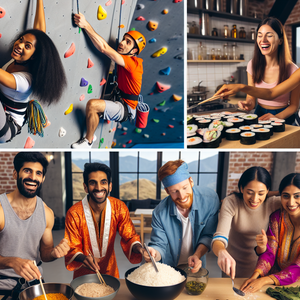Personalized Palate: How AI Can Transform Menu Recommendations

At the heart of AI-driven menu recommendations lies machine learning, a subset of AI that empowers systems to learn from data and improve over time. Restaurants can harness this technology by collecting and analyzing vast amounts of information about customer preferences, dining habits, and even social media trends. For instance, AI algorithms can sift through historical data, such as previous orders and customer feedback, to identify patterns and preferences. This data-driven approach enables restaurants to suggest menu items that resonate with individual tastes. Imagine stepping into a restaurant where the menu is tailored just for you, offering dishes that cater to your palate, dietary restrictions, and seasonal ingredients. Such personalized experiences not only enhance customer satisfaction but also foster a deeper connection between diners and restaurants.
The Guest Experience: Personalization at Its Best
Personalized menu recommendations can significantly improve the overall guest experience. AI can provide tailored suggestions that account for a diner’s dietary restrictions, such as allergies or preferences for vegan or gluten-free options. For example, if a guest frequently orders plant-based dishes, the AI can highlight new vegan offerings on the menu or suggest unique combinations that the diner may not have considered. Moreover, AI can analyze the context of the dining experience. If a guest is dining with friends, the system could suggest shareable plates or appetizers that enhance the communal experience. By understanding the nuances of each dining occasion, restaurants can create memorable moments that keep customers returning for more.
Supporting Examples
Several restaurants have successfully integrated AI into their operations to enhance the personalized dining experience. For instance, a popular fast-casual chain utilized an AI algorithm to analyze customer data and develop personalized meal suggestions. This resulted in a significant increase in customer engagement and repeat visits, demonstrating the effectiveness of AI in enhancing the dining experience. Another compelling case is an upscale dining establishment that adopted AI technology to refine its wine pairings. By analyzing customer preferences and food choices, the restaurant was able to offer tailored wine recommendations, elevating the dining experience and increasing wine sales. These examples illustrate how AI can create unique dining experiences that resonate with individual patrons.
The Business Benefits of AI Menu Recommendations
The advantages of AI-driven menu recommendations extend beyond enhancing the guest experience and can significantly benefit restaurant operations and profitability. By analyzing customer preferences, restaurants can make informed decisions about inventory management, ensuring that popular dishes are always available while minimizing food waste. Additionally, AI can help identify emerging trends by analyzing social media and online reviews. For instance, if a particular flavor or ingredient gains popularity, restaurants can quickly adapt their menus to incorporate these trends, attracting more customers and driving sales. This proactive approach to menu management allows restaurants to stay ahead of the curve in a competitive industry.
Case Study: Success Stories in AI-Driven Dining
A leading fast-casual chain that implemented an AI-driven recommendation system experienced a marked increase in customer satisfaction and loyalty. The AI analyzed customer data to generate personalized suggestions, leading to a more engaging dining experience. Similarly, a fine-dining restaurant using AI for wine pairings reported a notable uptick in wine sales, showcasing the direct impact of personalized recommendations on revenue.
As the dining landscape continues to evolve, the role of AI in personalizing menu recommendations is set to become increasingly vital. By leveraging machine learning algorithms to analyze guest preferences, dietary restrictions, and emerging trends, restaurants can create tailored dining experiences that delight customers and drive loyalty. The shift towards personalized dining is more than just a passing trend; it represents a fundamental change in how we experience food. As technology continues to advance, the potential for AI to transform the dining experience appears limitless. In the future, every meal could become a personalized culinary journey, inviting diners to explore new flavors and experiences that cater to their unique tastes. By investing in AI-driven menu recommendations, restaurants can not only enhance customer satisfaction but also position themselves for sustained success in a rapidly changing industry.
AI Data Analyst in Food Services
Restaurant chains, food tech startups, and hospitality consulting firms
Core Responsibilities
Analyze customer data to identify dining trends and preferences, optimizing menu recommendations.
Collaborate with restaurant management to implement data-driven strategies that enhance customer experience.
Develop dashboards and reports that visualize customer insights and operational metrics for stakeholders.
Required Skills
Proficiency in data analytics tools (e.g., SQL, Python, R) and experience with machine learning techniques.
Strong understanding of the food and beverage industry, with the ability to translate data into actionable insights.
Excellent communication skills to convey complex data findings to non-technical stakeholders.
Machine Learning Engineer for Culinary Applications
AI startups, established tech companies focusing on food services, and large restaurant chains
Core Responsibilities
Design and implement machine learning algorithms to enhance personalized menu recommendations.
Experiment with different models to improve accuracy in predicting customer preferences based on historical data.
Work closely with software developers and data scientists to integrate AI recommendations into customer-facing applications.
Required Skills
Proficiency in machine learning frameworks (e.g., TensorFlow, PyTorch) and programming languages (Python, Java).
Experience with data preprocessing and feature engineering specific to food-related datasets.
Knowledge of user experience design principles to ensure usability of AI-driven applications.
Culinary Marketing Strategist
Restaurant groups, food and beverage marketing agencies, and hospitality companies
Core Responsibilities
Develop marketing strategies based on AI insights to promote personalized dining experiences.
Create campaigns that highlight AI-driven menu recommendations and enhance customer engagement.
Analyze marketing performance data to refine strategies and increase ROI.
Required Skills
Strong background in digital marketing and experience with data analytics to track campaign effectiveness.
Familiarity with customer relationship management (CRM) systems and segmentation strategies.
Creative mindset with the ability to translate data insights into compelling narratives for diverse audiences.
User Experience (UX) Designer for Food Tech
Food tech startups, software development firms, and established restaurant chains focused on digital transformation
Core Responsibilities
Design intuitive user interfaces for applications that deliver personalized menu recommendations.
Conduct user research to understand customer needs and preferences in the dining experience.
Collaborate with developers to ensure that UX designs are implemented effectively in the final product.
Required Skills
Proficiency in design tools (e.g., Sketch, Figma, Adobe XD) and strong knowledge of user-centered design principles.
Experience conducting usability testing and gathering feedback to refine design concepts.
Understanding of the food service industry and the specific challenges faced by dining establishments.
Restaurant Operations Analyst
Restaurant chains, hospitality management companies, and food service consultancies
Core Responsibilities
Monitor and analyze operational metrics to improve efficiency and reduce food waste in restaurants.
Utilize AI-driven insights to forecast demand for specific menu items and optimize inventory management.
Collaborate with culinary teams to implement menu changes based on data-driven recommendations.
Required Skills
Strong analytical skills with experience in operations management and supply chain optimization.
Proficiency in data visualization tools (e.g., Tableau, Power BI) to present findings to management.
Knowledge of the restaurant industry's best practices and regulatory requirements.


